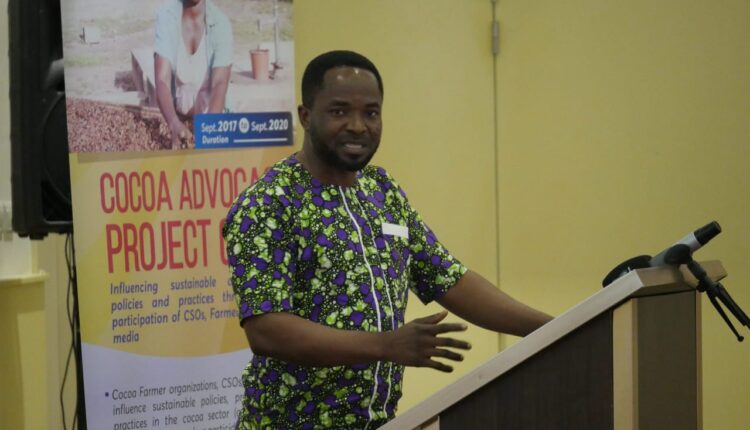A cocoa farmer, Ishmael Pomasi, says poor prices for cocoa continue to remain a daunting puzzle yet to be tackled by cocoa buyers and chocolate multinationals.
Pomasi, who is also the chairman of the Cocoa Abrabopa Association, regrets that cocoa farmers continue to endure poverty while companies are busily investing in programmes with little impact on farmer livelihoods.
“Most of us live in extreme poverty with no alternative income-generating activities; you look at the issue of galamsey and its level of devastation, if we don’t do something at this time to give some level of assurance and some kind of motivation to our farmers, in terms of the pricing, then farmers will continue to sell their farmlands to these illegal miners,” said Ishamel Pomasi.
Speaking on the sidelines of a recent Human Rights and Living Income Conference in Accra, the Pomasi quizzed by cocoa buyers were evading the cocoa farmers’ Living Income Differential.
“The prices are still too low; companies have publicly stated support for the LID, others have tried to reject or circumvent the relevant markets to avoid paying the premiums whiles others have tried to negotiate with governments to bring the producer floor price down,” he revealed.
Meanwhile, the Chief Executive Officer for SEND Ghana, Siapha Kamara, indicated during the conference that it is essential for value chain actors to critically look at the poor cocoa buying price which has subjected cocoa farmers in Ghana to poor living conditions.
According to him, the purpose of this two-day conference was not only to highlight the various ways in which the cocoa sector is abusing the rights, especially of children and women but also to bring to the fore that cocoa buyers are equally violating the rights of cocoa farmers by buying cocoa at very poor prices.
“We believe that farmers should not just be living. They should be thriving. That should be the goal and that is why we prioritize two things. The first is that the buyers should pay better prices.
“There should be freedom to organize. We are encouraging the cocoa farmers to have an independent voice,” he indicated.
Executive Secretary of the Cote d’Ivoire Ghana Cocoa Initiative, Alex Assanvo said he agrees that multinational companies must be able to offer a remunerative price, a fair and just price for the farmers who are at the start of the value chain, to enable them to have a living income.
“We will need the expertise of many to achieve our strategic vision of an Economic Pact for Sustainable Cocoa and ultimately, deliver higher prices for the farmers on the pathway to a living income.
“We urge you all, as civil society, and indeed the private sector partners here today to look critically at the part you play in the value chain and ensure that we all are driving action that delivers impact for the farmer,” he said.
As part of its efforts to help address challenges bedevilling the sustainable production of cocoa, SEND Ghana in partnership with INKOTA Netzwerk and SUDWIND assembled key stakeholders within the cocoa value chain to discuss issues bordering on living income and human rights in Ghana’s cocoa sector as a catalyst for ensuring improved welfare of farmers as well as increasing government and private sector responsiveness for a sustained cocoa sector.
The two-day conference was held in Accra to discuss living income differential policy and human rights issues in Ghana’s cocoa sector.
In attendance at the two-day conference were officials from the Ministry of Finance, Members of GCCP, GARDJA, SEND Ghana, EcoCare Ghana, Oxfam Ghana, Rainforest Alliance, SUDWIND and the Concerned Cocoa Farmers Association of Ghana.
- Cocoa Civil Society Urges EU to Invest in Deforestation Regulation - June 12, 2024
- West African Leaders Must Strengthen Trade and Price Mechanism - April 29, 2024
- Cote d’Ivoire-Ghana Cocoa Initiative Opens Permanent Office - April 20, 2024
